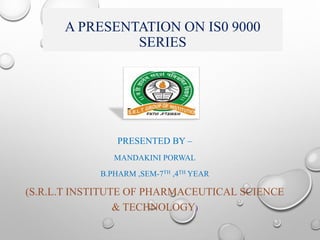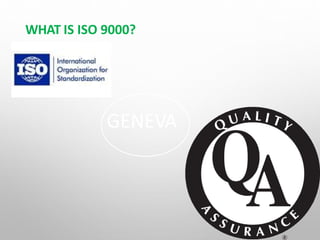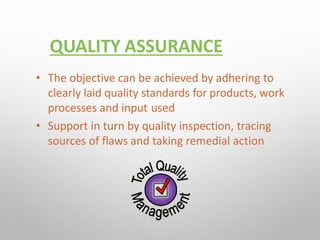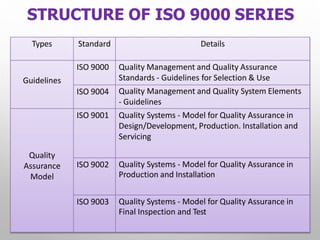Iso 9000 series
- 1. A PRESENTATION ON IS0 9000 SERIES PRESENTED BY â MANDAKINI PORWAL B.PHARM ,SEM-7TH ,4TH YEAR (S.R.L.T INSTITUTE OF PHARMACEUTICAL SCIENCE & TECHNOLOGY)
- 2. CONTENT- âĒ CONCEPT OF T.Q.M âĒ PRINCIPLE OF T.Q.M âĒ QUALITY ASSURANCE âĒ I.S.O âĒ I.S.O 9000 SERIES âĒ NEED FOR I.S.O âĒ IMPORTANCE OF ISO 9000 SERIES
- 3. WHAT IS ISO 9000? GENEVA
- 4. TOTAL QUALITY MANAGEMENT Total quality management (TQM) is a management process aimed at bringing about excellence through the continuous enhancement of quality in an organisation. The basic philosophy of TQM is âDoing the right thing right the first time, on time, all the time, always striving for improvement, and always satisfying the customersâ.
- 5. âĒ Everyone is involved in Total âĒ Continuously improving service to customers Quality âĒ With data and profound knowledge Management
- 6. TQM IN PUBLIC SERVICE âĒ The purpose is to provide information and guidance to the Head of Department in planning and activating the process of improving quality in their departments. âĒ Create an environment that is conducive for the inculcation of an excellent work culture. TQM Concept â Continues process in creating a culture of excellent for the whole organisation and is customer-driven â Aim to achieve total quality in all its operation aspects.
- 7. PRINCIPLES OF TQM Focus on customer Quality Assurance Measurement of performance Strategic Planning Training & Recognition Leadership & commitment by top management Teamwork
- 8. QUALITY ASSURANCE âĒ The objective can be achieved by adhering to clearly laid quality standards for products, work processes and input used âĒ Support in turn by quality inspection, tracing sources of flaws and taking remedial action
- 9. TQM ( Employee involvementand Product improvement) ISO (certification shows that an organizationis following well- established industry standards) * ISOis the processthat typically shifts an organization's culture to allow successful TQM implementation
- 10. In the context of concerned with ISO 9000, the totality quality is of the characteristics thatsatisfy needs. Quality is defined as the degree to which a set of inherent characteristics fulfill the requirements.
- 11. WHAT IS QUALITY ASSURANCE? Quality assurance refers to âall those planned and systematic actions that are necessary to provide adequate confidence that a product or service will satisfy given requirements for qualityâ.
- 12. ISO9000 isaset of five guideline standards that define the requirements for aneffective quality managementsystem.Ofthefive,only three are certification standards (ISO9001, 9002and 9003);both ISO9000 and 9004are guidelinesfor theotherthree.
- 13. International Organization for Standardization (ISO) ISOisGreekroot meaningequal These standards are guidelines on how to document the processesin specificindustries. The goal is consistency and a set of complete, easy to followinstructions. ISO guidelines is where the TQM process can becomeabitoverwhelming.
- 14. ISO 9000 WHAT IS QUALITY??? The totality of features and characteristics of a product or service that bears on its ability to satisfy express or implied needs
- 15. STRUCTURE OF ISO 9000 SERIES Types Standard Details Guidelines ISO 9000 Quality Management and Quality Assurance Standards - Guidelines for Selection & Use ISO 9004 Quality Management and Quality System Elements - Guidelines Quality Assurance Model ISO 9001 Quality Systems - Model for Quality Assurance in Design/Development, Production. Installation and Servicing ISO 9002 Quality Systems - Model for Quality Assurance in Production and Installation ISO 9003 Quality Systems - Model for Quality Assurance in Final Inspection and Test
- 16. ISO standards are just a Quality Management System (QMS) with specific guidelines on how to document the processes. ISO is not, however, a way togetaroundTotalQuality Management. Since ISO is focused on consistency and record- keeping, while TQM is focused on employee involvement and product improvement, they go hand in hand. Both are customer requirements focused, but Total Quality Management is really the drivingfactor.
- 17. NEED FOR ISO âĒ âĒ Main factors are "Quality andStandardization" around the world Worldwide progress in tradeliberalization â Interpenetration of sectors â Worldwide communications systems â Global standards needs for emergingtechnologies â Developing countries âĒ I.S.O certification increase the confidence of custemers.
- 19. IMPORTANCE OF ISO 9000 SERIES- âĒ ISO 9000 IS A QUALITY MANAGEMENT STANDARD THAT PRESENT GUIDELINES INTENDED TO INCREASE BUSINESS EFFICIENCY AND CUSTOMER SATISFACTION âĒ THE GOAL OF ISO 9000 IS TO EMBED A QUALITY MANAGEMENT SYSTEM WITHIN AN ORGANISATION ,INCREASING PRODUCTIVITY ,REDUCING UNNECESSARY COSTS,& ENSURING QUALITY OF PROCESSES & PRODUCT



















